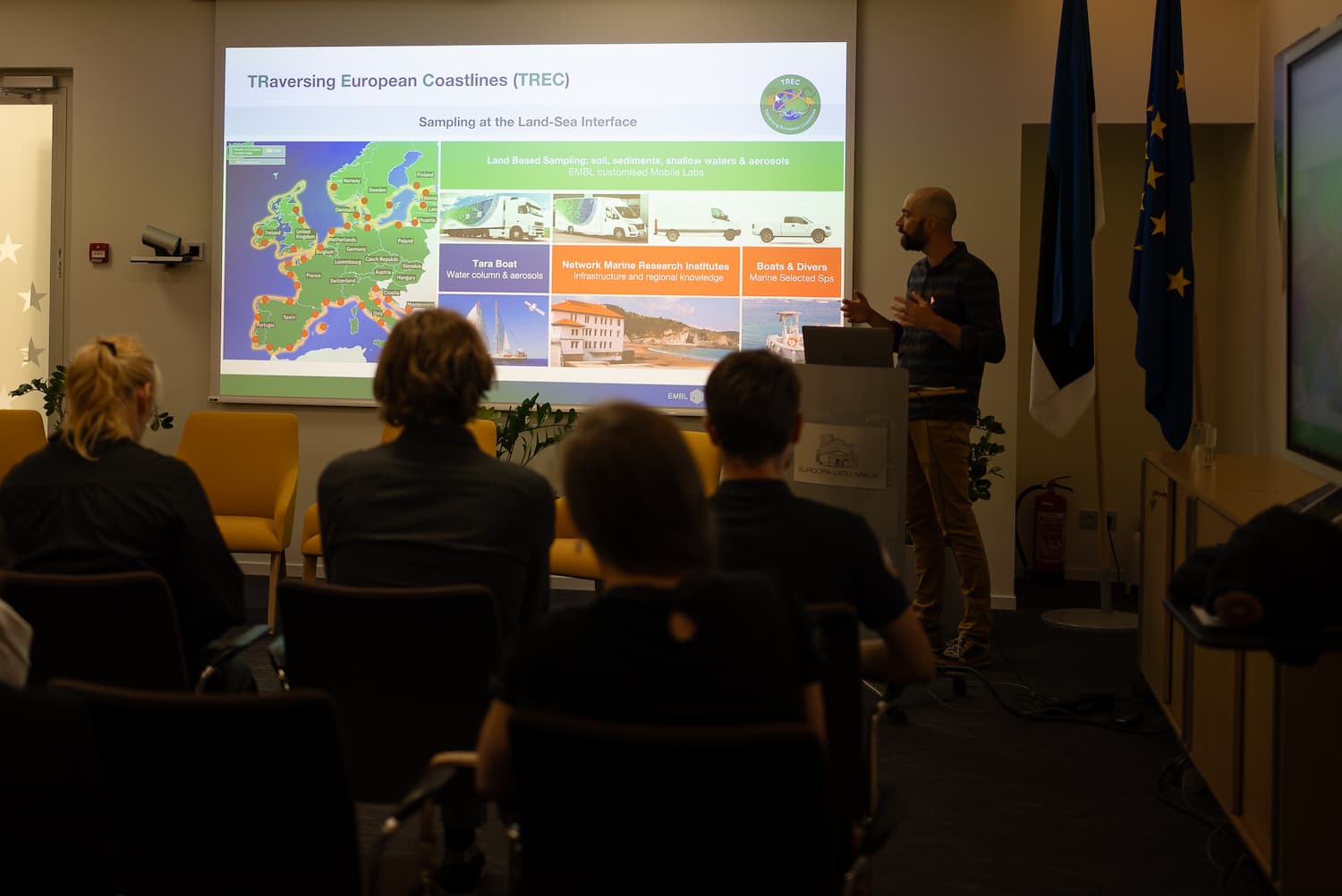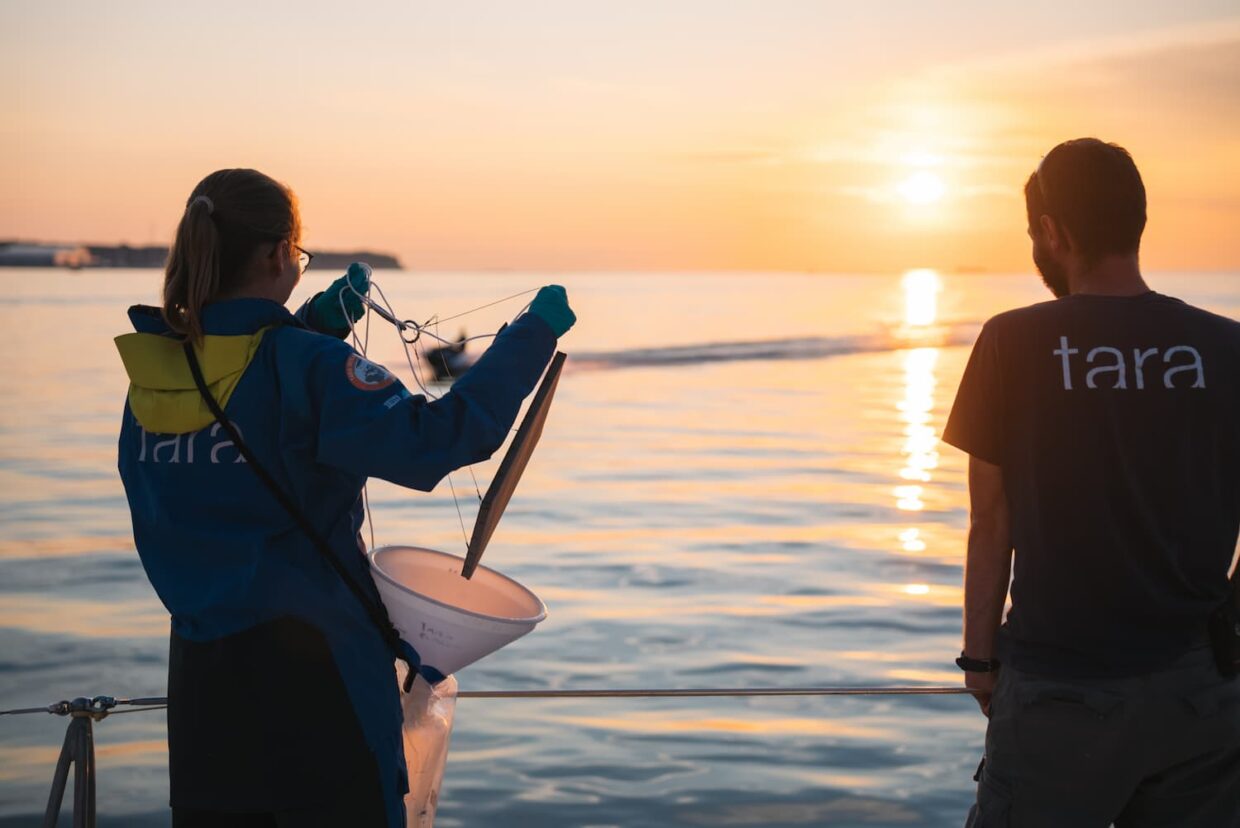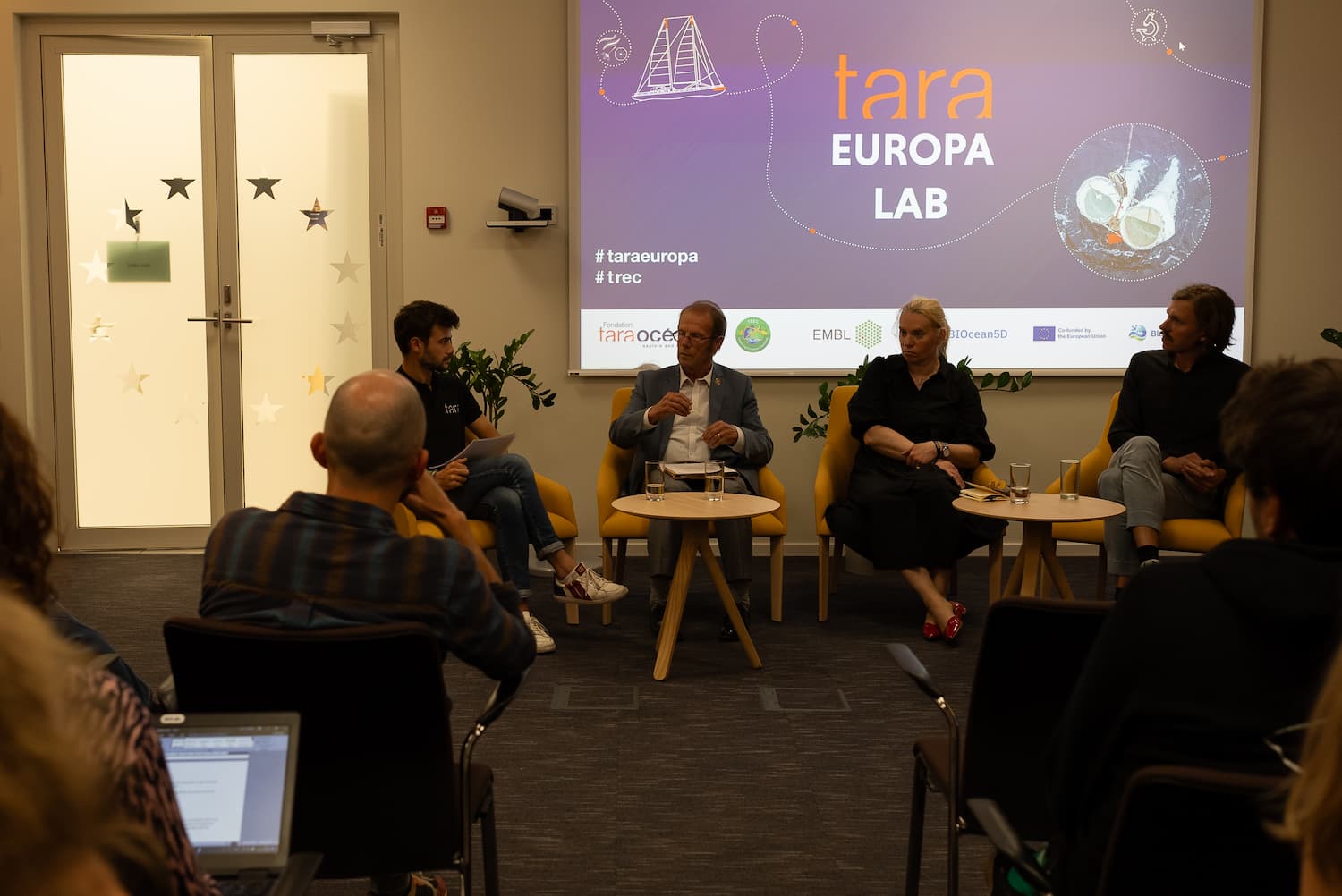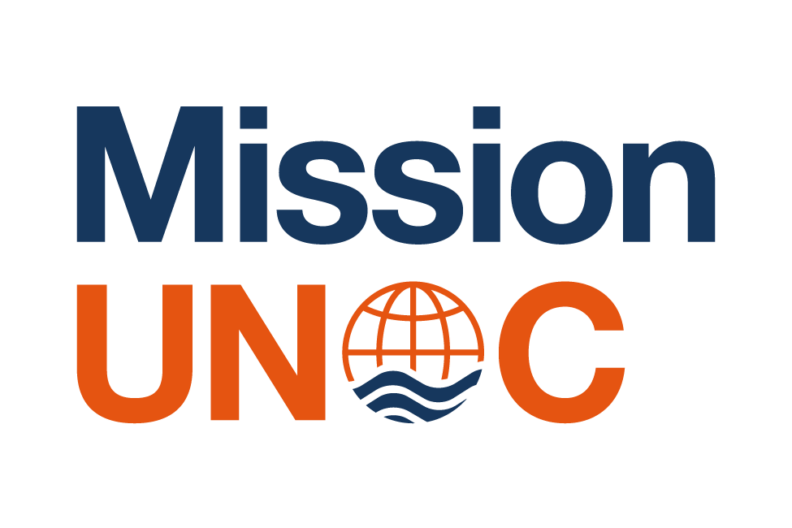How can science be better integrated into political decision-making? Tara Europa Lab’s ambition
Why do scientists and policy-makers need to communicate?
What is science-to-policy?
Science-to-policy is the process of enabling political decision-makers to make informed choices underpinned by scientific knowledge. The volume of scientific knowledge produced is immense, and yet there is still a relatively wide gap between science and policy, particularly when it comes to taking effective account of scientific data in policy. There are two main reasons for this.
Firstly, science has historically been synonymous with discovery and understanding: future scientific questions arise of their own accord in the wake of published results. This means that science does not necessarily respond to societal issues.
Secondly, even if there is scientific content that is relevant to the needs of decision-makers, the spaces for direct exchange between these players are still limited.

Climate policies, the gateway to science in politics
This lack of direct correlation between scientific output and political decision-making has nevertheless taken a completely different trajectory over the last 50 years, with the consolidation of a consensus on the human origin of climate change. The scientific observation that the Earth system is changing in a way that is endangering the planet’s survival has led to a consensus that human activities are the origin of climate change. The observation that the Earth system is changing in ways that threaten the survival of humankind necessarily calls for an awareness that is rapidly translated into political decisions.
The Stockholm Conference in 1972 was the first major event at the interface between science and politics. Organised in response to the historic Meadows report, which theorised the limits to growth, the conference laid the conceptual foundations of the circular economy.
But it was only the beginning of this interaction between science and politics. Even 20 years later this scientific consensus had very little impact on the decision-making process. The Rio Earth Summit, held in 1992, marked the second major moment in the introduction of scientific knowledge into the political sphere. The Summit endorsed the concept of sustainable development, explicitly linking the economic and political notion of development with the sustainability needs raised by scientists.
The Climate Conference was the entry point for the academic scientific world into the decision-making process. The culmination of this science/policy nexus lies in the creation of the Intergovernmental Panel on Climate Change (IPCC), an international scientific council whose aim is to consolidate a scientific consensus. More recently, the content of their publications now even includes specific advice on what to do to combat climate change.
But where does the Ocean fit into this science-to-policy picture? As with climate change, civil society has played a key role in bringing together scientists studying marine ecosystems and political decision-makers. In France, the Tara Ocean Foundation has been involved in building this science-to-policy link for over 10 years.
The Tara Ocean Foundation: bringing ocean science to decision-makers
20 years of science at the service of ocean conservation policies
For 20 years, the Tara Ocean Foundation has been applying innovative, high-level science to the study of the Ocean. Above all, it works to share this new approach with all sections of society: the general public, schoolchildren, professionals and politicians.
Tara’s science focuses on two main areas:
- Understanding the microscopic biodiversity of the ocean and its functions;
- Studying the pollutants in the ocean that threaten the functioning and integrity of ecosystems.

Right from the start of its scientific programmes, the scientific knowledge generated by the schooner’s expeditions has been directly linked to international climate negotiations. Plankton, the invisible majority of the Ocean, plays a fundamental role in the global climate balance. By carrying out photosynthesis, phytoplankton pumps atmospheric carbon into the deep ocean, where it is sequestered. Through their in-depth study of these planktonic organisms, the scientists taking part in the Tara adventure have provided the Foundation with a solid knowledge base to bring the key climatic role of the Ocean to the attention of political decision-makers.
The date that symbolises the Tara Ocean Foundation’s entry into the ‘science to policy’ arena is the schooner’s stopover in Rio de Janeiro in 2010 during the Tara Oceans mission, which led 2 years later to the Foundation’s presence at the United Nations conference on sustainable development, ‘Rio+20‘.
In 2015, when France hosted COP21 in Paris, the schooner Tara fully embodied this space dedicated to putting scientists in touch with political decision-makers by hosting the COP Blue Pavilion: a space dedicated to putting forward the scientific arguments in favour of including the Ocean and its role in climate change in the Paris Agreements. Together with a number of partners, the Foundation launched the Ocean and Climate Platform, a structure designed to consolidate a dialogue between the scientific community and the public authorities.
Since then, thanks to its status as a special observer at the UN, the Foundation has taken part in most of the major Ocean-related events: the Climate COP, the COP of the Convention on Biological Diversity, the United Nations Conference on the Oceans, etc. Advocacy themes have broadened, but the desire to facilitate exchanges between decision-makers and scientists remains at the heart of the philosophy of the Foundation’s advocacy team.
Expeditions, an opportunity to unite an Ocean community
The excitement generated by the Tara schooner’s stopovers during its scientific expeditions is one of the key opportunities for engaging decision-makers in a strong relationship with the Ocean. In 2014, on the occasion of the Tara Méditerranée expedition, the Foundation initiated a series of dialogues between scientists and local stakeholders on issues specific to the regions of the stopovers. These workshops, the Tara Med Labs, helped to unite a community around the common challenge of combating plastic pollution in the Mediterranean. The objective of these labs was to initiate an exchange of ideas based on the true perspective of sustainable development, i.e. one that takes into account all the variables of a problem (economic, social, environmental).
The Tara Europa Lab, a forum for exchanges between European players
For 2 years, EMBL and the Tara Ocean Foundation will be leading an expedition along the entire European coastline, with the aim of gaining a better understanding of coastal biodiversity and pollution caused by human activities. This unique expedition, TRaversing European Coastline (TREC), is deploying a set of standardised protocols on land and at sea along its entire route. It will thus have extremely valuable potential as an inventory of what is in the soil, water and sediments. It will also enable comparisons to be made between the different regions studied. By not focusing on a specific issue, TREC will provide an overview of the “exposome”, i.e. the combination of molecules from our activities to which the ecosystem is exposed.
The Tara Europa Lab’s goal is to show how TREC can contribute to the specific challenges of each region. At some of the expedition’s major ports of call, the opportunity will be taken to link this pan-European sampling to issues specific to the region crossed. The aim is to initiate a dialogue between local players, whether from civil society, government institutions or academic bodies, and to identify how TREC’s results could benefit ongoing initiatives.
The Tara Europa Labs take the form of round-table sessions for exchange and communication, and address the issue of the link between scientific production, the needs of society and political decision-making.

Working with European projects: a unique opportunity to work together
This series of events is the fruit of collaboration between the Tara Ocean Foundation and EMBL, within the framework of two EU-funded projects: BIOCEAN5D and BlueRemediomics. Since the Tara Europa Lab brings together different players to disseminate the research and future scientific results of the TREC expedition as widely as possible, it was obvious that this project had to be carried out in collaboration. Cooperation with European projects will amplify the impact of these events. The strength of the collective will be a driving force so that the Tara Europa Lab reaches a wider community and transcends national borders. z
BIOCEAN5D is a major interdisciplinary project designed to gain a better understanding of the impact of human activity on Europe’s seas and coasts. The data collected locally as part of TREC and the analysis of the impact of human activities on marine and terrestrial biodiversity will strengthen and consolidate the scientific arguments specific to local issues. The Tara Europa Labs will be the meeting place for TREC scientists and local stakeholders (NGOs, political decision-makers, representatives of local industry, etc.).
BlueRemediomics will develop new tools and approaches to explore marine microbiome data. One of the aims of Blueremedimics is to produce applied tools based on the study of the microbiome. The programme will provide relevant tools for policy-makers. The Tara Europa Lab will connect communities of stakeholders across Europe’s coasts and identify initiatives already in place for which its tools would be beneficial.
The Tara Europa expedition is an unprecedented scientific adventure for the Tara Ocean Foundation, with a comprehensive research program focusing on pollution issues at the land-sea interface. In terms of environmental issues, the mission is also of major interest to Tara’s advocacy, this time focusing on the impact of various forms of land-based pollution on the marine environment, as well as on human health. The Foundation, which has special observer status at the United Nations, has for over ten years played the role of facilitator between science and decision-makers in ocean governance processes, such as those concerning the high seas and climate.
This time, the targets will be different, such as the negotiations on the plastics treaty or the European Union’s chemicals directive.
(With the TREC scientific program, and with the publication of the first results in the next few years, the Foundation will have the legitimacy to bring findings and recommendations to the political arena, with a view to supporting current and future legislation aimed at limiting the use of certain substances by our society. Because today we know that certain substances used in various chemical products – BPOs, PFAs, Phthalates, among others – are toxic and present a threat to the health of marine ecosystems and to our own health).
More details on Tara Europa Lab
Tallinn: eutrophication
The Baltic Sea is a relatively closed ocean basin: the water renewal cycle can last up to 30 years. Pollution and inputs discharged by human activities on land therefore run off into the sea and concentrate there in extremely high quantities. In particular, agricultural inputs (fertilizers or livestock effluents), once in the water, stimulate the growth of algae and bacteria in such proportions as to asphyxiate the environment. This phenomenon is known as eutrophication.
Tallinn’s Tara Europa Lab therefore turned its attention to this key issue, where the key to improvement lies above all in the transition of agricultural and industrial activities on land. Joonas Plaan, a member of the Board of Directors of the Estonian Fund for Nature (EFN), began by recalling this incontrovertible scientific fact, relayed for several decades by Estonian NGOs including EFN. Alongside Helen Sooväli-Sepping, Vice-Rector for Green Transition at TalTech University, they called on public authorities to take swift, ambitious action. The Estonian government, through Harry Liiv, member of the Estonian Ministry of Climate and Chair of the Helsinki Commission, was also able to address the economic and social aspects raised by the fight against eutrophication, as well as measures already in place such as input quotas allocated to Baltic Sea coastal countries. Much remains to be done, but all participants welcomed this dialogue on one of the top priority environmental issues for Estonia and its neighbouring countries.
Galway: Science Ethical principles and Blue Carbon
A new workshop to engage with civil society – Tara Europa Lab – was held in Galway, Ireland, on September 14, 2023, in collaboration with partners from the BlueRemediomics and BIOcean5D projects, co-funded by the European Union.
This session of dialogue between scientists and local stakeholders in Ireland welcomed various players from Irish civil society: members of the academy, institutional leaders and members of associative networks. Chris Bowler, Scientific Director of the Tara Ocean Foundation, initiated a discussion on the ethical principles of research, applied to ecosystem management and the notion of Blue Carbon. How far can we go in terms of human intervention in nature? Should we support, for example, projects to artificially fertilize the ocean to increase CO2 capture? A wide-ranging topic that led to a rich and diverse discussion, moderated by Professor Abbe Brown, a specialist in research ethics at the University of Aberdeen, as part of the BlueRemediomics project.
At the final sequence, a group of over 20 Irish marine stakeholders were able to share and discuss the local challenges faced in restoring marine biodiversity, the potential of innovative blue carbon solutions, and how policies can address these issues.
The Tara Europa Labs will reconvene again next year in january in Lyon.
